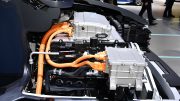Electricity-based synthetic fuels – so-called power-to-x fuels (PtX) – are a “central building block” in making maritime and air transport climate-friendly, environment minister Svenja Schulze (SPD) said during the presentation of the Global Power-to-X Atlas of the Fraunhofer Institute for Energy Economics and Energy System Technology (IEE). When made using renewable energy, electricity-based fuels offer a way to reduce emissions in sectors that cannot switch to direct electricity use, such as long-haul flights and shipping. Ramping-up power-to-x technologies will also create job opportunities in Germany, Schulze said. “The development and production of PtX technologies requires the combined know-how of researchers, engineers and technical specialists from Germany.” The government wants to foster cooperation between German industry and what it calls “high-potential countries”, where renewable energy can be produced at a large scale. The PtX Atlas gives insight in potential areas outside of Europe, “based on strong sustainability criteria as well as socio-economic criteria for society, politics and the economy”, says Kurt Rohrig of the Fraunhofer IEE.
Using renewable electricity to produce hydrogen, CO₂-neutral methane or other fossil fuel substitutes could solve some of the toughest challenges of the energy transition. Making gas or liquids with wind and solar power could provide carbon-neutral fuel for heating and transport and pave the way for large-scale seasonal energy storage. A lot of energy is lost during the conversion, however, making the technology comparatively expensive.





